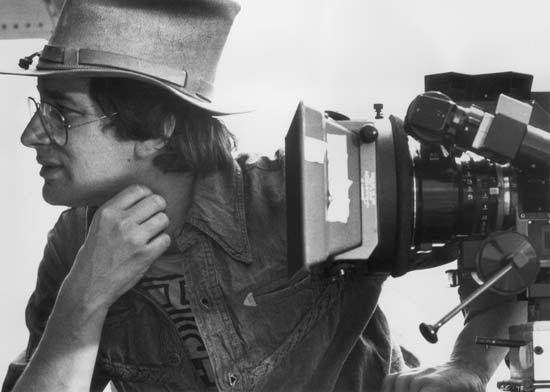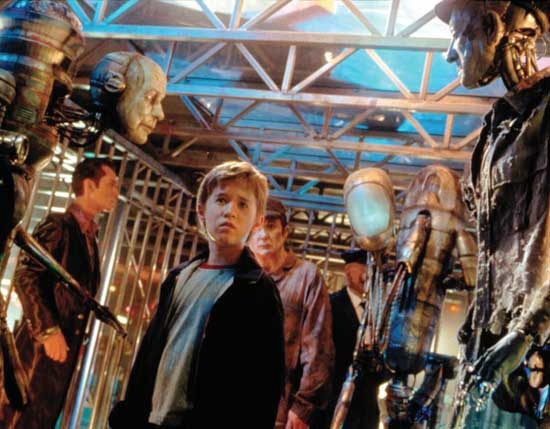Spielberg, Steven
American film director and producer
born December 18, 1946, Cincinnati, Ohio, U.S.
 American motion-picture director and producer whose highly entertaining and escapist films enjoyed unprecedented popularity.
American motion-picture director and producer whose highly entertaining and escapist films enjoyed unprecedented popularity.An amateur filmmaker even before he entered high school, Spielberg attended California State College, Long Beach, and attracted the attention of Universal Pictures with his short films. For Universal he directed episodes of television series and television movies, including the thriller Duel (1971), whose success enabled him to begin making theatrically released motion pictures, beginning with The Sugarland Express (1974).

 His next picture, Jaws (1975), a highly praised thriller, became one of the highest-grossing films ever and established many of the touchstones of Spielberg's work. In many of his early films, an ordinary but sympathetic main character is enlightened through a confrontation with some extraordinary being or force that gradually reveals itself as the narrative unfolds. Among these antagonists are a great white shark in Jaws, extraterrestrial beings in Close Encounters of the Third Kind (1977), a whimsical alien in E.T.: The Extra-Terrestrial (1982), and dinosaurs in Jurassic Park (1993). Spielberg's film Raiders of the Lost Ark (1981) and its sequels, which starred Harrison Ford (Ford, Harrison) as handsome archaeologist Indiana Jones, used rich colour cinematography, brisk editing, memorable musical soundtracks, and inventive special effects to create a cinematic experience that was typically light yet highly suspenseful. The aggressive commercialism and optimism of Spielberg's films became the prevailing style in Hollywood in the late 20th century. His pervasive influence was recognized in 1986 by the Academy of Motion Picture Arts and Sciences, when it honoured him with the Irving G. Thalberg Award.
His next picture, Jaws (1975), a highly praised thriller, became one of the highest-grossing films ever and established many of the touchstones of Spielberg's work. In many of his early films, an ordinary but sympathetic main character is enlightened through a confrontation with some extraordinary being or force that gradually reveals itself as the narrative unfolds. Among these antagonists are a great white shark in Jaws, extraterrestrial beings in Close Encounters of the Third Kind (1977), a whimsical alien in E.T.: The Extra-Terrestrial (1982), and dinosaurs in Jurassic Park (1993). Spielberg's film Raiders of the Lost Ark (1981) and its sequels, which starred Harrison Ford (Ford, Harrison) as handsome archaeologist Indiana Jones, used rich colour cinematography, brisk editing, memorable musical soundtracks, and inventive special effects to create a cinematic experience that was typically light yet highly suspenseful. The aggressive commercialism and optimism of Spielberg's films became the prevailing style in Hollywood in the late 20th century. His pervasive influence was recognized in 1986 by the Academy of Motion Picture Arts and Sciences, when it honoured him with the Irving G. Thalberg Award. Though Spielberg enjoyed tremendous popular success with these films, his proclivity for broad storytelling hampered his attempts at more complex filmmaking. While generally well received, The Color Purple (1985) and Empire of the Sun (1987), in the view of many critics, lacked emotional depth or insight. Schindler's List (1993), the true story of a group of Polish Jews who avoided Nazi extermination camps with the aid of a German industrialist, quieted many of Spielberg's critics. Shot in black and white and with unflinching detail, it won Academy Awards for best picture and best director. Five years later Spielberg again received the best director honour, for another World War II film, Saving Private Ryan (1998), which starred Tom Hanks (Hanks, Tom) and Matt Damon (Damon, Matt). AI: Artificial Intelligence (2001), a science-fiction film project that Spielberg inherited from director Stanley Kubrick (Kubrick, Stanley), is perhaps his most emotionally complex film, though it left critics and audiences divided.
Though Spielberg enjoyed tremendous popular success with these films, his proclivity for broad storytelling hampered his attempts at more complex filmmaking. While generally well received, The Color Purple (1985) and Empire of the Sun (1987), in the view of many critics, lacked emotional depth or insight. Schindler's List (1993), the true story of a group of Polish Jews who avoided Nazi extermination camps with the aid of a German industrialist, quieted many of Spielberg's critics. Shot in black and white and with unflinching detail, it won Academy Awards for best picture and best director. Five years later Spielberg again received the best director honour, for another World War II film, Saving Private Ryan (1998), which starred Tom Hanks (Hanks, Tom) and Matt Damon (Damon, Matt). AI: Artificial Intelligence (2001), a science-fiction film project that Spielberg inherited from director Stanley Kubrick (Kubrick, Stanley), is perhaps his most emotionally complex film, though it left critics and audiences divided.In 2002 Spielberg returned to his signature themes and style with Minority Report, a futuristic thriller starring Tom Cruise (Cruise, Tom), and Catch Me If You Can, the true story of a con man (played by Leonardo DiCaprio (DiCaprio, Leonardo)) who spent years eluding an FBI agent (Hanks). In 2004 Spielberg again directed Hanks in The Terminal, about an eastern European immigrant who finds himself stranded at the airport in New York City. Munich (2005) told the story of the 11 Israeli athletes who were murdered at the 1972 Olympic Games and the Israeli government's program to hunt down the terrorists involved. Spielberg also directed Indiana Jones and the Kingdom of the Crystal Skull (2008), which appeared nearly 20 years after the last installment in the series, Indiana Jones and the Last Crusade (1989).
Spielberg was also the executive producer of many television series, documentaries, and films by other directors. In 1994 he joined with studio executives Jeffrey Katzenberg and David Geffen to form DreamWorks SKG, an entertainment company created to produce movies, animation, recordings, and television programs. In 2006 they sold the company to Viacom (Viacom Inc.) for $1.6 billion. Two years later Spielberg announced he was forming an independent studio.
Additional Reading
Philip M. Taylor, Steven Spielberg: The Man, His Movies, and Their Meaning, new expanded 3rd ed. (1999).
- Funk, Isaac Kauffman
- vitamin B12
- vitamin B6
- vitamin B complex
- vitamin C
- vitamin D
- vitamin E
- vitamin K
- vitamins
- Vitascope
- Vitebsk
- Vitellius, Aulus
- Viterbo
- viticulture
- Vitier, Cintio
- Viti Levu
- vitiligo
- Vitim Plateau
- Vitim River
- Vito Genovese
- Vito Pandolfi
- Vitoria, Battle of
- Vitoria, Francisco de
- Vitoria-Gasteiz
- Vito Volterra